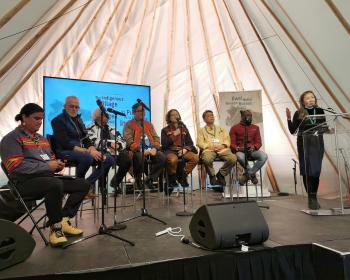
On November 26, 2006, more than 20 people met in Chuicaxtún, Canton Chivax, Totonicapán, Guatemala, to create the project of Community Radio La Niña 88.5 FM. Without any prior technical knowledge of radio broadcasting, production, programming, administration, or how to install a transmitter, we took our first steps in community communication.
For 51 years, Cultural Survival has partnered with Indigenous communities to advance Indigenous Peoples' rights and cultures worldwide. We envision a future that respects and honors Indigenous Peoples' inherent rights and dynamic cultures, deeply and richly interwoven in lands, languages, spiritual traditions, and artistic expression and rooted in self-determination and self-governance.
In 2022, The Zienzele Foundation identified the need for a communal space in the Chiware region of Zimbabwe for Shona women’s cooperatives to host their organizational meetings, health clinics, and marketing of traditional handicraft work. In collaboration with Cultural Survival’s Keepers of the Earth Fund, they have since built a community center complex near the village of Mupagamuri to serve the five surrounding villages.
For centuries, the Indigenous Peoples who live in the north of Argentina in the province of Jujuy have maintained their culture and ways of life differently from people from other parts of the country. In Jujuy, there are more than 400 Indigenous communities, a majority of whom are Kolla Peoples, but also Guaraní and Oclolla.